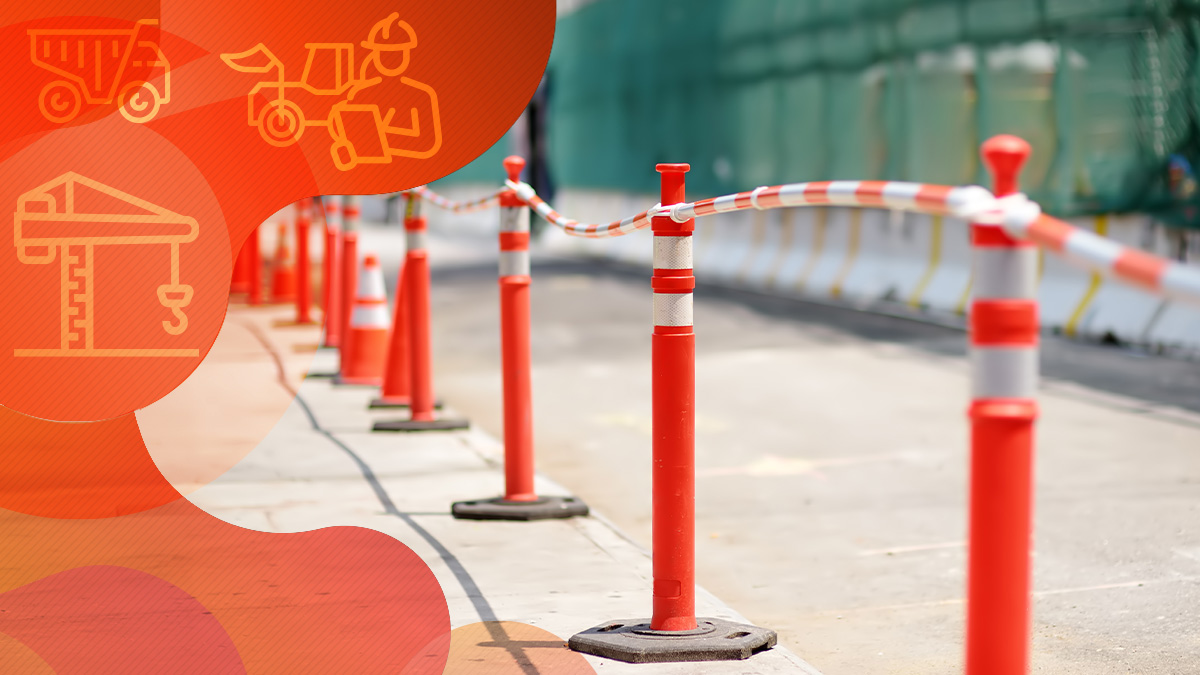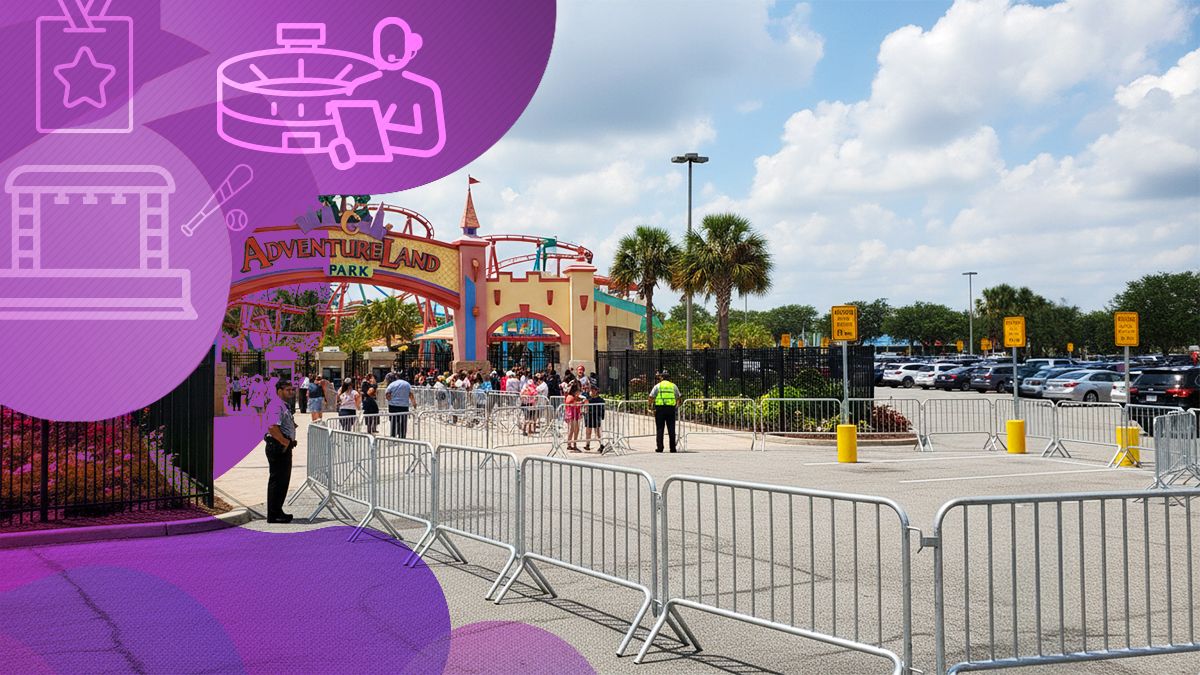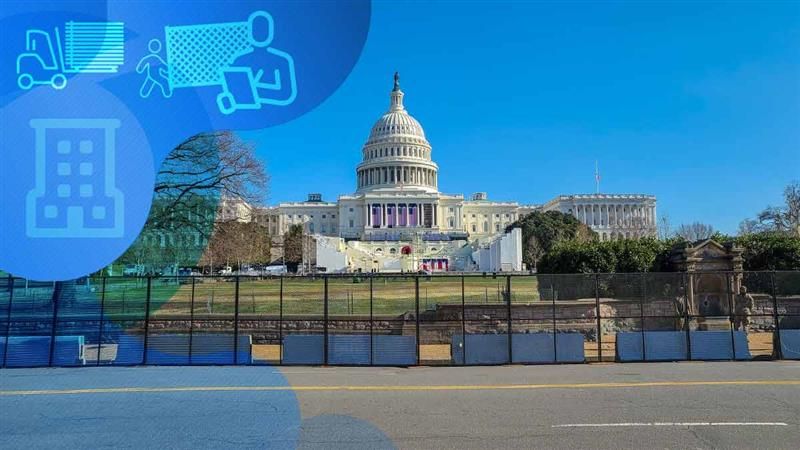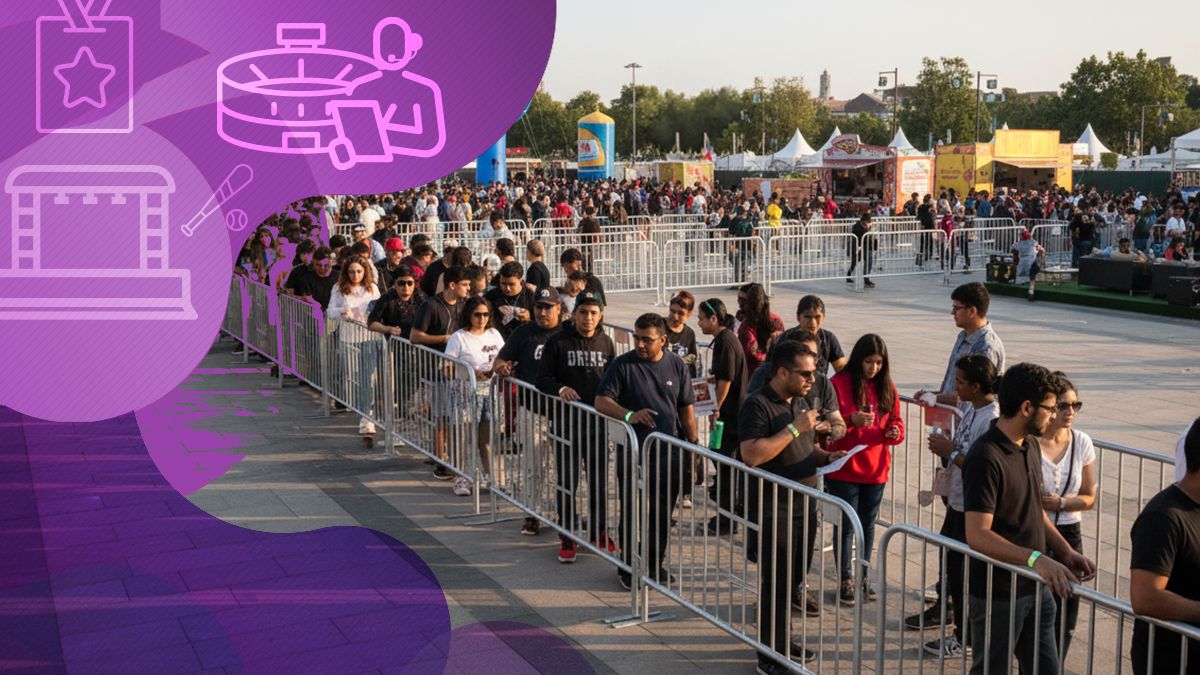What Is a Delineator? Everything You Need to Know Before You Buy
What is a delineator and which type do you need? Learn about types, materials, MUTCD compliance and expert deployment tips from SONCO's traffic safety specialists.

You've seen them thousands of times without really noticing: those bright orange posts lining a highway work zone, flexible tubes guiding cars through a parking lot, reflective markers at a nighttime event. Those are all delineators.
If you're here, you probably need to buy some and want to make sure you're getting it right. After 50 years helping contractors, facility managers, municipalities and event organizers with traffic safety, we'll walk you through everything you need to know.
What Is a Delineator?
A delineator is a traffic control device used to guide and redirect drivers and pedestrians through a space safely. The term covers a wider range of products than most people realize, including flexible posts, channelizer cones, vertical panels and bar barriers.
In everyday use, "delineator" most often refers to the tall, flexible tubular posts you see in work zones and parking lots. But officially, according to the FHWA's Manual on Uniform Traffic Control Devices (MUTCD), delineators are reflective devices used to indicate the alignment of a roadway, particularly at night or in poor visibility conditions.
The short version: if it's marking a path, blocking a lane, or guiding traffic from point A to point B, it's probably a delineator.
Delineator vs. Traffic Cone vs. Barrier — What's the Difference?
These three products often get used interchangeably, but they're not the same thing. Here's a quick breakdown:
Product
Best For
Typical Use
Delineator post
Long term or semi-permanent channeling
Work zones, parking lots, bike lanes
Traffic cone
Short term, quick deployment
Events, temporary road closures, emergency situations
Barrier
Physical separation and impact protection
High traffic roads, construction perimeters, crowd control
The key distinction is purpose. Cones are ideal for quick, short term deployments where flexibility is a priority. Barriers offer physical protection for high impact situations. Delineators are the go-to when you need a more permanent channeling solution with high visibility built in.
When in doubt, think about how long the setup needs to stay in place and how much physical protection you actually need. That usually points you to the right product pretty quickly.


Types of Delineators
Not all delineators are the same, and picking the right type for your situation makes a real difference. Here are the most common ones:
Flexible tubular posts are the most recognizable type. Tall, cylindrical and usually bright orange, they're a staple of work zones and parking lots. Their flexibility means they bounce back if hit by a vehicle, making them durable and low maintenance.
Channelizer cones are a hybrid between a traditional traffic cone and a delineator post. They're wider at the base for extra stability and typically taller than a standard cone, giving them better visibility in high speed environments.
Vertical panels are flat, rectangular devices mounted on a base. They offer a larger reflective surface than tubular posts, making them especially effective at night or in low visibility conditions.
Bar barriers are horizontal devices that connect between posts or stands to block or restrict access to an area. They're common in parking lots, pedestrian areas and event venues.
Drum barriers are large, cylindrical devices that provide high visibility and a degree of impact protection. You'll typically see them at highway lane closures and construction sites.
What Are Delineators Made Of?
Most delineators are made of high density polyethylene (HDPE) or low density polyethylene (LDPE). Both are durable, weather resistant plastics that can handle the kind of abuse that comes with outdoor traffic control, but they behave a little differently.
HDPE is stiffer and more resistant to impact, making it a good choice for high traffic environments. LDPE is more flexible, which means it bends on impact and returns to its original shape more easily. For most work zone and parking lot applications, LDPE flexible posts are the most popular choice for exactly that reason.
The base is just as important as the post itself. A rubber base adds weight and grip, keeping the delineator stable in windy conditions or when placed on uneven surfaces. Some bases can also be filled with water or sand for extra stability in more demanding environments.
Finally, reflective tape is a standard inclusion on most quality delineators. It's what makes them visible at night and in poor weather, and it's not something you want to skip or cut corners on.
Where Are Delineators Used?
Delineators are one of those products that show up in more places than most people expect. Here are the most common applications:
- Construction and work zones are the most obvious one.
Delineators channel traffic away from active work areas, protect workers and guide drivers safely through lane shifts and closures. This is also where MUTCD compliance matters most, as federal guidelines dictate spacing, reflectivity and placement requirements for roadway applications.
- Parking lots are one of the most underrated use cases.
Delineators help define lanes, protect pedestrians, mark reserved areas and prevent vehicles from cutting through spaces they shouldn't.
- Events and crowd control require a different approach.
Here the priority is guiding foot traffic rather than vehicles, so visibility and placement matter more than impact resistance. Delineators paired with retractable belt toppers are a popular choice for this application.
- School zones demand extra caution.
High visibility colors and reflective tape are non negotiable here, and placement needs to account for both vehicle and pedestrian traffic patterns throughout the day.
- Emergency response situations often require fast, temporary setups.
Delineators are ideal here because they're quick to deploy, easy to move and highly visible under any lighting conditions.
MUTCD Compliance — What You Need to Know
If you're deploying delineators on or near a public roadway in the United States, the Manual on Uniform Traffic Control Devices (MUTCD) is the rulebook you need to know. It's published by the Federal Highway Administration and sets the national standard for all traffic control devices, including delineators.
The most important things to understand are spacing, reflectivity and color. For roadway applications, the MUTCD specifies how far apart delineators should be placed based on the speed limit of the road. Higher speed roads require tighter, more frequent placement to give drivers enough reaction time. For most highway work zones, that means delineators every 20 to 40 feet in taper areas.
Reflectivity is non negotiable for any nighttime or low visibility application. The MUTCD requires delineators used on public roads to meet specific retroreflectivity standards, meaning they need to reflect headlights back to the driver clearly enough to be seen at a safe distance.
Color also follows federal guidelines. Orange is the standard for temporary traffic control, white is used for permanent roadway delineation and yellow indicates specific lane guidance situations.
It's worth noting that MUTCD compliance is most critical for public roadway applications. Private property situations like parking lots and event venues have more flexibility, though following the same standards is always good practice.
6 Expert Tips to Deploy Delineators Effectively
1. Measure and plan before you buy
Before purchasing anything, measure the entire area where delineators will be needed. Sketch it out and mark exactly where each device will go. A good rule of thumb is to buy about 10% more than your count, just in case. Underbuying creates dangerous gaps, and having a few extras on hand is always worth it.
2. Deploy generous tapers
A taper is the lead-in area where traffic transitions from a normal lane into a delineated zone. For high speed roads, start your taper early with delineators spaced further apart, then gradually tighten the spacing as the lane narrows. For low speed areas a shorter, more funnel-like approach works fine.
3. Give early warnings
For construction and work zones, early warning signage upstream of your delineator setup is standard practice and often required. For commercial applications like drive-thrus or temporary pickup zones, a simple branded sign at the entrance goes a long way in keeping things moving smoothly.
4. Don't skip the reflective tape
Reflective tape is not optional. It's a life safety feature. Most quality delineators come with it standard, but always verify before purchasing. For maximum visibility, look for delineators with reflective bands at multiple heights.
5. Consider add-ons for high traffic situations
Retractable belt toppers, blinking lights and weighted bases are all worth considering depending on your application. They're small investments that can make a significant difference in visibility and stability.
6. When in doubt, ask an expert
Most traffic safety suppliers, including SONCO, offer free consultations. A quick conversation with someone who knows the product can save you from costly mistakes and make sure you're fully compliant for your specific application.
How to Choose the Right Delineator
With so many options available, it helps to narrow things down with a few simple questions before you buy.
How long does the setup need to stay in place?
For short term situations, a standard flexible post or channelizer cone works perfectly. For semi-permanent installations, look for heavier bases and more durable materials.
How fast is the traffic?
Higher speed environments demand taller, more visible delineators with reflective tape at multiple heights. For low speed or pedestrian applications, a smaller, lighter option is usually sufficient.
What are the weather conditions?
Wind, rain and extreme temperatures all affect performance. A rubber weighted base is a smart choice for any outdoor application, and UV resistant materials matter more than people realize for long term deployments.
Is this indoors or outdoors?
Indoor applications like warehouses, parking structures and event venues have different requirements. Reflectivity matters less, but stability and visibility in artificial lighting conditions become more important.
Do you need MUTCD compliance?
If you're working on or near a public roadway, make sure the products you choose meet federal reflectivity and color standards. If you're on private property, you have more flexibility but following the same standards is always a smart practice.
Frequently Asked Questions
What is the difference between a delineator and a traffic cone?
Delineators and traffic cones serve similar purposes but are built for different situations. Cones are ideal for quick, short term deployments where flexibility is the priority. Delineators are better suited for longer term setups where durability and higher visibility are needed.
How far apart should delineators be placed?
It depends on the application and the speed of traffic. For highway work zones, the MUTCD recommends placing delineators every 20 to 40 feet in taper areas. For lower speed environments like parking lots, spacing can be more flexible based on the specific layout.
Do delineators need to be MUTCD compliant?
Only for applications on or adjacent to public roadways. Private property applications like parking lots and event venues are not subject to MUTCD requirements, though following the same standards is always recommended.
How long do delineators last?
A quality delineator made of HDPE or LDPE can last several years with proper care. UV exposure, vehicle impacts and extreme temperatures are the main factors that shorten lifespan.
Replacing reflective tape periodically also helps maintain visibility over time.
Can delineators be used indoors?
Yes. Warehouses, parking structures and event venues are all common indoor applications. For indoor use, focus more on stability and visibility under artificial lighting than on reflectivity.
What colors do delineators come in?
The most common colors are orange, white and yellow, each with specific applications per MUTCD guidelines. Some suppliers including SONCO offer additional colors for private property and branding purposes.
Whether you're setting up a highway work zone, organizing a large event or simply need to improve traffic flow in your parking lot, getting your delineator setup right matters. The good news is you don't have to figure it out alone.
At SONCO we've been helping customers find the right traffic safety products for 50 years. Browse our full catalog or request a quote and we'll help you put together exactly what you need.
Trend now

Theme Park Safety: Avoiding Fines and Accidents with Crowd Control
Learn how crowd control products help keep theme parks safe, avoid accidents, and improve operations. Explore SONCO’s solutions for better crowd management.

Anti Scale Fence for Temporary High-Security Needs
Anti scale fence designed for temporary high-security perimeters, crowd control, protests, and emergency response where standard fencing falls short.

Why Bike Rack Barricades Are the Go-To Choice for Crowd Control
Explore why bike rack barricades are the go-to for crowd control. Learn how these versatile, durable barriers keep events, construction sites, and more organized.





